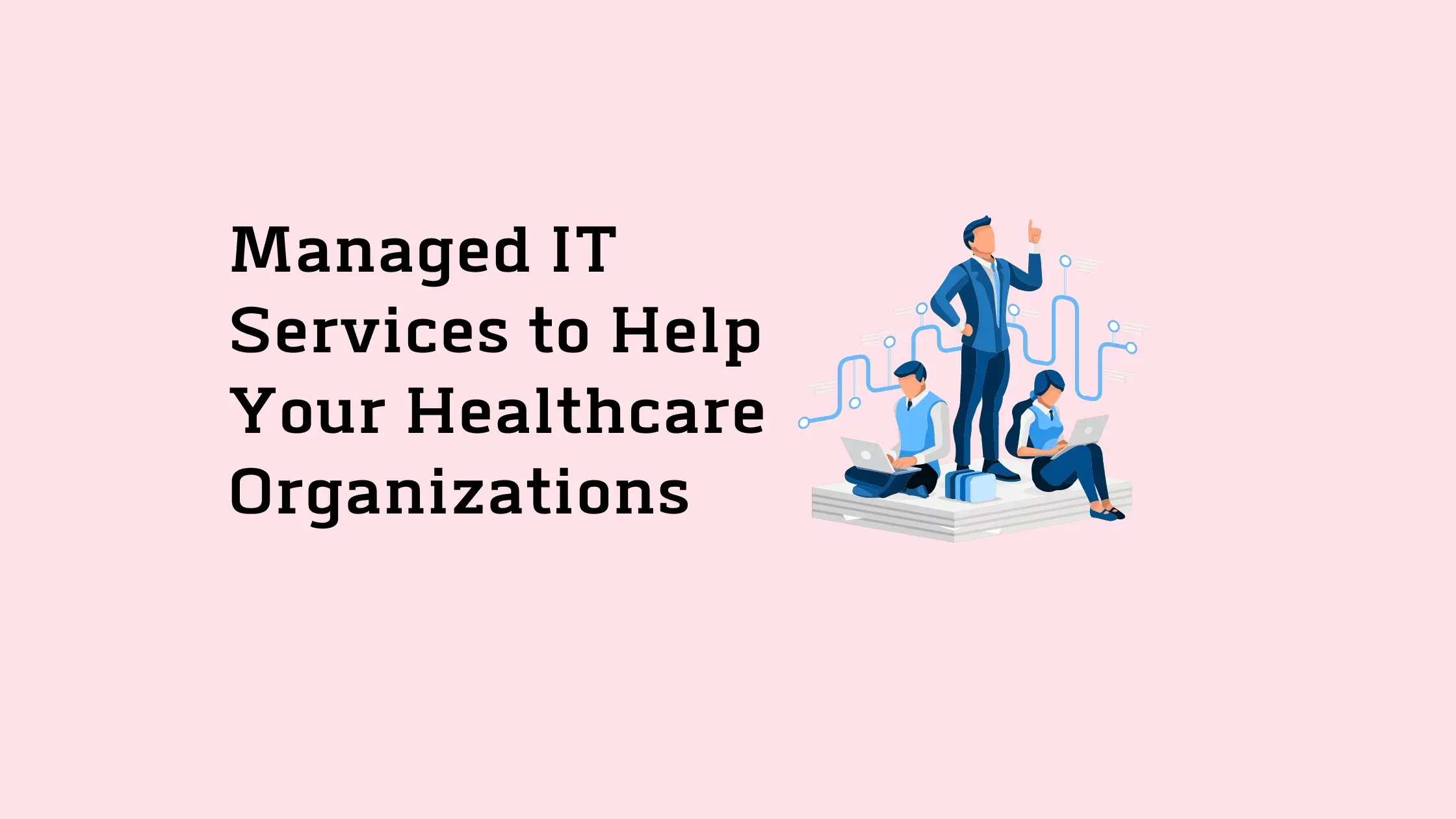Introduction:
Healthcare IT teams must manage systems and infrastructure to provide uninterrupted care. They must also deal with cutbacks in funding and the implementation of new technologies to maintain more social distancing and sanitation in their physical areas.
Significant workforce reductions exacerbate these difficulties. Job losses in the healthcare practices sector are second only to those in the restaurant business, according to federal labor statistics released in May. It is attributable to a significant decrease in elective procedures and non-emergency visits.
Leaders may then explore the benefits of enlisting the assistance of a partner.
The arrangement, known as managed services, can give important IT insights, particularly for the smaller or newly amalgamated quality of care facilities. Health systems may focus on essential business objectives by entrusting cloud installations, data center solutions, mobile efforts, collaboration tools, and security to a third party like CDW.
Why you need healthcare IT Services:
You can focus on treating patients and assisting customers while Visualutions manages your technology and IT services.
For then a quarter-century, Visualutions has helped medical with high-quality technology, and IT-managed services, including:
- Lower your operational costs.
- Quality and productivity will improve.
- IT service should improve patient satisfaction.
- Maintain the relevance and modernity of your IT infrastructure.
- Boost IT efficiency
Providing the Managed IT Services for Healthcare that You Require:
Occasionally, your computer will simply stop working. You don’t need to know why; all that matters is that it works. Visualutions’ healthcare plans professional technicians will respond swiftly and expertly when you require service. Visualizations may remotely access your computer to assist you or send a specialist to your location.
Visualizations provide healthcare research and quality. IT managed services and support, including:
- Personnel augmentation
- Asset Management is the management of assets.
- Customer Service Desk
- Equipment
- Service for Data Disaster Recovery Planning and Implementation
Personnel augmentation:
- Visualizations professionals can help you improve your current IT personnel.
- Provide local IT help with dedicated on-site professionals.
- For remote IT help, a team of IT experts is accessible.
- Application specialists provide application assistance.
Asset Management is the management of assets:
- Continuous hardware maintenance and active monitoring
Customer Service Desk:
The Visualutions HelpDesk solution provides hardware and software assistance from a single point of contact to reduce confusion. In addition, the Visualutions Service Desk offers the following services:
- During normal business hours, response time is less than one hour.
- After hours, the response time is less than 2 hours.
- Vulnerability testing is performed regularly to reduce risk.
- Dedicated support team to address all of your needs, regardless of location or technical experience.
- Communication with you should be clear, precise, and ongoing.
Equipment:
- Infrastructure experts that know how to construct, install and maintain infrastructure
Providing You With The Service You Deserve:
Visualizations have the knowledge, experience, and equipment to help your healthcare providers, no matter how large or small, improve, expand, and protect their technology capabilities.
- Information technology solutions from a single source
- More than two decades of connected healthcare experience
- More than 80 full-time members of the committee
- Become an expert in handling applications that will assist you in achieving your goals.
- Make use of cutting-edge, appropriate technology.
Bridging the Information Technology Gap
According to a CDW white paper on the subject, managed services — which can be scaled up or down depending on demand — can save IT expenditures by as much as 40%. After COVID-19 took off billions in revenue, this has become even more important.
Even before the outbreak, spending was a concern: According to a Gartner report released in February, 59 percent of healthcare CIOs have observed operating expense difficulties in the last four years, with 41 percent reporting budget shortfalls.
According to the Society for Human Resource Management, 4.2 million IT jobs (including employment in healthcare) went vacant last year, necessitating outside assistance. The group also cites a CompTIA 2020 survey, which revealed that one-third of companies outsource some IT needs on a regular basis in a normal year.
Managed services have a wide range of responsibilities. They could include system and data center management, as well as maintenance and upgrade activities. Virtualization initiatives may be made at work so that employees can safely work from home.
For efficient cost optimization, this innovative, strategic thinking is essential. “The best thing we can do right now is work with peers and partners,” says Tom Stafford, CTO of CDW Healthcare research and quality.
Mindfulness
Aside from cost savings, managed services ensure that firms correctly examine, monitor, and evolve their technology deployments and related services – and that all efforts are compliant with the most recent security and HIPAA rules.
This is especially true during COVID-19: According to the Department of connected Healthcare plans and Human error Services, the number of a network of healthcare professionals breaches recorded between February and May is 50 percent greater than in the same period last year.
Throughout the engagement, recipients can count on specialist engineers, 24/7 support, and industry-specific expertise, as well as increased capacity to pivot in the face of a public health crisis that has IT teams working around the clock to provide high-quality treatment.
Managed services aren’t a replacement; it’s a partnership tailored to each company’s specific requirements. When the world has changed so dramatically, having a strong ally on your side provides the foresight and strength to be ready for whatever comes next.
Healthcare client Providers Should Use Managed IT Services Providers for Five Reasons
IT solutions must be fast, scalable, reliable, and, most importantly, secure, regardless of the size of your healthcare client organization or the number of offices you have. In a nutshell, well-managed IT is essential. The complexity of IT environments is increasing as practice management grows, along with HIPAA and other laws. The complexity of IT environments is growing as the cloud expands beyond single-event record-keeping to support the complete continuum of care in the digital age. The Healthcare industry should hire a Managed IT Professional Service Provider to keep up with the times, optimize system performance, and improve patient care delivery (MSP).
What Are the Benefits of Using a Managed IT Services Provider?
In this complex digital age, what alternatives do healthcare professionals have? How do they improve patient care while maximizing IT operations? How can they cut costs and get the most out of their IT investments? I’m grateful you inquired. By employing Managed IT Services Provider, more modern healthcare professional providers are adopting a Managed IT Services approach.
Here are five reasons why modern healthcare providers should work with a managed services provider.
- The Right Service Combination:
Managed IT Services offer the appropriate balance of security, scalability, dependability, and flexibility to help you transform your IT. Network of Healthcare professionals businesses is increasingly looking for Managed IT services providers to handle a portion of their IT operations, as they are already under pressure to maintain their own IT services on a tight budget.
2. Reduced TCO and Cost Efficiencies:
Using MSPs instead of totally in-house operations can result in significant cost reductions. A healthcare client facility can hire a full virtual information security office (VISO) or security department for a fraction of the cost of full-time cybersecurity personnel pay, benefits, and training, not to mention the added technology and software costs.
3. Security and Compliance that is proactive
Any Health IT (HIT) strategy must prioritize security and compliance. Due to the proliferation of new medical technology and the fact that the stakes are often higher with these technologies, round-the-clock proactive security is required. Security monitoring is provided by MSPs from security operations centers 24 hours a day, 7 days a week, 365 days a year. Most MSPs provide complete network, server, and storage monitoring and support.
Security is in our DNA at Secure-24; it is the cornerstone of all we do. We provide services from our world-class SSAE 18-compliant data centers and use ITIL and COBIT standards and processes to ensure the highest level of security and compliance for key applications and data. Our security experts make IT compliance painless and assist in securing even the most complicated IT environments. Our security teams keep an eye on systems that allow us to:
– Security risks can be identified and remedied more quickly.
– A trained security specialist from our Security Operations Center acts as an extension of your IT department (SOC)
— Security of mission-critical systems and patient information
4. Ensure that your IT team is the right size.
It’s not always easy to locate skilled personnel with the knowledge and experience needed to maintain mission-critical systems and applications working smoothly. A dearth of health systems IT experts with relevant experience is a fundamental factor for the rising usage of managed IT services. A good MSP acts as an extension of an advanced healthcare provider’s IT team, having the knowledge and ability to keep systems working smoothly.
Managed IT services enable businesses to offload regular IT work while also ensuring that their investment in their own IT team is receiving the most bang for their buck. Internal IT resources can be laser-focused on next-generation solutions and automation to improve the quality of patient care with these providers.
5. Cloud Migration and New Technologies
Migrating to the cloud and/or managed IT Services allows firms to migrate to a more secure solution by introducing tools that aid in the instant conversion and also include various security and compliance elements as part of the system. Hospital executives are increasingly realizing that they cannot afford to maintain their own IT and Information Security departments. This drive to transition to managed IT operations frequently results in innovative ideas. MSPs also offer cloud transformation and migration services, which include determining a strategic, cost-effective, and secure cloud migration roadmap.
Conclusion:
Using a managed service provider (MSP) establishes a strategic business partner relationship with customized solutions to address unique business and technology needs. Secure-24 Managed Services offers more services than the majority of MSPs. Like other MSPs, our teams look after the infrastructure, but they also look after security, databases, ERP systems, and provide Help Desk services. We have access to a global network of resources as part of NTT, which increases our technical expertise and global reach of our basic Healthcare Managed Services to assist clients to optimise their IT environments and change their companies digitally.

Priyadharshini K.R is a professional blogger with over 3 years of experience who works at Squash Apps. She is dedicated to providing high-quality content to help clients get more visibility on the search engine result pages. She works hard to boost her clients’ online presence through various content writing services. Hailing from Erode, she is passionate about helping people understand content marketing through easily digestible materials.


